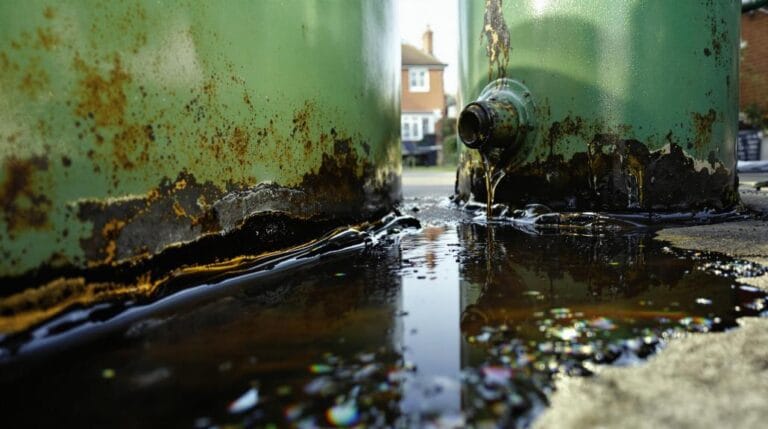Discovering an oil tank leak can be a homeowner’s nightmare, with potential consequences ranging from environmental damage to significant financial burden. For Northern Ireland residents, where oil heating systems are commonplace, understanding how to properly claim for these damages is crucial. However, the complexity of oil leak claims often requires professional expertise to ensure full settlement offers.
The moments following the discovery of an oil tank leak are critical, not just for minimising damage but for preserving your right to compensation. Professional claims management becomes essential in understanding the intricate process of documenting damage, assessing environmental impact, and securing appropriate settlement amounts.
When dealing with oil tank leaks, homeowners should promptly document the damage and inform their insurance company. Standard policies usually cover sudden spills but often exclude gradual leaks resulting from poor maintenance. A claims management service can assist in navigating complex policies, gathering evidence, and negotiating with insurers for improved settlements. Key steps include shutting off the oil supply, containing the leak, and engaging professional assessors. Receiving proper guidance throughout this process can be the determining factor between a denial and full compensation.
Key Takeaways
- Contact a professional claims management service immediately after discovering the leak to assess the damage and review policy coverage details.
- Document all evidence thoroughly with photographs, videos, and detailed notes of the damage before commencing any cleanup efforts.
- Engage loss assessors through the claims management service to negotiate with insurers and maximise potential settlement amounts.
- Keep receipts for all expenses related to cleanup, repairs, and environmental remediation to support your insurance claim.
- Submit a comprehensive claim package including maintenance records, professional assessments, and evidence of proper tank upkeep.
Understanding Home Insurance Coverage for Oil Tank Leaks
When disaster strikes in the form of an oil tank leak, homeowners need to understand exactly what their insurance covers. Most standard policies cover sudden oil spills and the resulting property damage.
However, there is a significant distinction between sudden accidents and gradual leaks. Insurance providers typically exclude damage resulting from poor oil tank maintenance or general wear and tear. Working with specialist Loss Assessors can help maximise your claim payout under your home insurance policy. This means that regular inspections and upkeep are not just good practice – they are essential for maintaining valid coverage.
While policies often include third-party liability protection, there are usually strict financial limits. Environmental cleanup costs can quickly exceed these caps. Many homeowners are surprised to learn that standard policies do not cover the expenses associated with environmental investigations.
Understanding these insurance exclusions is crucial for protecting your interests. Have you reviewed the specific coverage terms of your policy regarding oil leaks?
Learn more: Explore common pitfalls that may also affect your oil spill claim process.
Common Causes and Early Warning Signs of Oil Leaks
Three major factors typically cause oil tank leaks in residential properties: physical damage, environmental conditions, and inadequate oil tank maintenance.
Understanding these causes helps homeowners prevent costly repairs and maintain their insurance coverage.
Regular leak detection checks can reveal early warning signs that every homeowner should monitor:
- Unexplained drops in oil levels without increased usage.
- Visible rust spots or corrosion on tank surfaces.
- Water pooling around the base of the tank.
- Changes in soil colour or dying vegetation nearby.
Being proactive about tank inspections is essential for protecting both your property and the environment.
A strong odour near the tank area is often one of the first indicators of a potential leak that requires immediate attention.
Most insurance claims arise from long-term neglect rather than sudden damage.
Steps to Take When You Discover an Oil Leak
Discovering an oil leak requires fast and strategic action to safeguard both property and the environment. The first steps in emergency response include identifying the source of the leak and immediately shutting off the oil supply at the tank.
Placing buckets under any drips helps contain the situation, while opening windows reduces the accumulation of fumes. Regular inspection of your heating system can help identify potential valve leaks before they become major problems.
Safety is paramount during oil cleanup. Keep children and pets away from the affected area and wear protective gear when handling contaminated materials.
Spread absorbent materials such as sand or cat litter to prevent the oil from spreading further.
Contact your insurance company promptly to initiate the claims process. They will guide you through documenting the damage and connecting with specialist contractors for professional cleanup.
Remember to monitor nearby drains and waterways; if there is any risk to water supplies, local environmental authorities should be notified immediately.
Learn more about the essential actions to take after a home heating oil spill here.
Understanding the Insurance Claims Process
When homeowners discover an oil leak, their first step should be a thorough assessment of the damage while documenting everything with clear photographs and detailed notes.
Working with professional loss assessors can significantly improve the chances of a successful insurance claim, as they bring expertise in evaluating damage and understanding policy terms.
These specialists help ensure that all aspects of the damage are properly documented and that claims are filed correctly, potentially leading to better settlement outcomes. The claim resolution process for oil leaks can take several months depending on the extent of damage and cooperation of involved parties.
Learn more about how oil spill damage impacts home insurance claims.
Initial Assessment Steps
An oil tank leak insurance claim begins with several critical assessment steps that can significantly influence the success of your claim. Understanding these steps helps safeguard your interests and ensures proper handling of your claim from the outset.
Your initial assessment should concentrate on four key actions:
- Review your insurance policy coverage details immediately.
- Document all damage with photographs and detailed notes.
- Contact a professional assessor for expert evaluation.
- Implement safety measures to prevent further issues.
It is essential to maintain thorough records of every action taken. Most insurers expect prompt notification and detailed documentation of the damage.
This proactive approach demonstrates your commitment to minimising losses and strengthens your position during the claims process.
Safety remains paramount—avoid any sources of ignition near the spill area while gathering evidence. With £20,000 being the average cost for cleaning an oil spill, immediate professional assessment is crucial for accurate claims processing.
Learn more: Discover the steps to file a successful oil spill damage claim in this article.
Working With Loss Assessors
After completing the initial assessment, many homeowners benefit greatly from partnering with a professional loss assessor. These professionals bring essential knowledge of insurance policies and claims processes, ensuring homeowners receive fair treatment throughout their oil tank leak claim.
The advantages of engaging a loss assessor extend far beyond managing paperwork. They act as dedicated advocates who negotiate with insurers, thoroughly document evidence, and coordinate with specialists to address all aspects of the damage. Loss assessors work to secure maximum compensation for affected homeowners.
Their expertise often results in quicker settlements and improved outcomes.
Working with a loss assessor significantly enhances the efficiency of the claims process while reducing stress. They handle complex negotiations, arrange temporary accommodation when required, and ensure that every detail of the claim receives proper attention.
Why manage this challenging process alone when expert support is readily available?
How Claims Management Services Can Help
Dealing with an oil tank leak can quickly become overwhelming for homeowners who are unfamiliar with the claims process. Claims management services offer expert guidance and professional representation throughout your insurance claim experience. Their expertise can significantly enhance the efficiency of the claims process while alleviating stress during a challenging time.
These specialists provide substantial support through:
- Comprehensive damage assessments to ensure nothing is overlooked
- Direct communication with insurance companies on your behalf
- Expert negotiation to maximise your settlement amount
- Complete management of repair and restoration work
Claims management services understand the complexities of oil leak claims and handle them effectively. They manage documentation, coordinate with contractors, and keep you informed at every stage. With a no win, no fee policy, you can pursue your claim confidently knowing there’s no financial risk.
This professional support ensures you receive fair compensation while minimising disruption to your daily life.
Maximising Your Insurance Claim Settlement
Securing the maximum insurance settlement for an oil tank leak requires careful planning and thorough documentation. Effective claim negotiation begins with organising evidence and understanding policy coverage limits. Similar to personal injury claims, establishing a minimum settlement figure helps create a strong baseline for negotiations.
| Strategy | Action | Impact |
|---|---|---|
| Document Everything | Take photographs and videos | Strengthens claim validity |
| Track Expenses | Keep all receipts | Justifies settlement amount |
| Gather Statements | Interview witnesses | Builds supporting evidence |
| Maintain Records | Log all communications | Creates accountability |
The presentation of evidence plays a significant role in achieving optimal settlements. Always present documentation in a clear, organised manner and be prepared to justify each expense. Remember to include both direct costs like clean-up and indirect impacts such as property value reduction.
Consider engaging a professional claims management service to navigate complex negotiations and ensure that no important evidence is overlooked during the settlement process.
Preventing Future Oil Tank Leaks and Policy Updates
Prevention of oil tank leaks begins with understanding both the risks and the necessary precautions homeowners must take.
Regular maintenance and preventive measures are essential for protecting your property and the environment.
To safeguard your home and ensure proper coverage updates, consider these vital steps:
- Schedule weekly inspections of tanks and pipes for signs of damage.
- Arrange annual servicing with certified OFTEC technicians.
- Monitor oil consumption patterns to detect potential leaks early.
- Review insurance policies regularly to ensure adequate coverage.
Remember that prevention is far less costly than dealing with a leak.
Installing secondary containment systems and keeping detailed maintenance records can significantly reduce your risk.
Most insurers look favourably on proactive homeowners who take steps to prevent oil tank incidents.
Protecting your oil tank lines from foot traffic damage is crucial for preventing mechanical ruptures and subsequent leaks.
Domestic Oil Tank Leak Claim Support
Successfully claiming for domestic oil tank leak damages requires a methodical approach and expert knowledge of insurance procedures. The technical nature of these claims, combined with environmental considerations and complex policy terms, makes professional support invaluable in securing appropriate compensation.
As Northern Ireland’s specialist claims managers, PCLA understands the urgency and complexity of oil tank leak claims. We’re committed to guiding homeowners through every step of the claims process, ensuring thorough documentation and maximum settlement potential.
If you discover a leak from your oil tank, PCLA can help you manage your claim quickly and correctly. Our team offers a free survey and a prompt assessment to review your policy details and document the damage.
We record evidence with clear photographs, videos, and detailed notes before any cleanup work begins. Our loss assessors work with insurers on your behalf, making sure all expenses—from repairs to environmental cleanup—are covered.
Don’t let the complexity of oil leak claims overwhelm you – trust our experienced team to secure the compensation you need for complete restoration and peace of mind.



